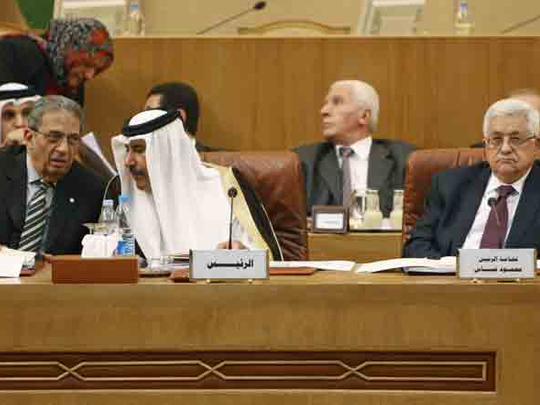
Dubai: The decisions taken by the Arab foreign ministers on Wednesday — including the rejection of further Palestinian-Israeli peace talks without a "serious offer" and to seek a UN Security Council resolution against Israeli colony building — have raised questions about the limits Arabs can go under the present circumstances, analysts said.
Palestinian and Arab officials, however, defended the move, saying their decisions were well studied and fell within defined steps.
"It was better than setting new deadlines," Palestinian analyst Hani Al Masri said. "But it was not up to the expected progress [the Arab position] and it didn't reflect [the requested] advancement. Dangers are bigger than handling them in such a manner," he told Gulf News.
Arab foreign ministers should have "spelt out what they want not only from the US, but also from the UN, the Security Council and other blocs in the world, so these parties will take their positions more seriously," Al Masri added
After meeting with Palestinian President Mahmoud Abbas in Cairo on Wednesday, the foreign ministers announced that "resuming the negotiations will be conditioned on receiving a serious offer that guarantees an end to the Arab-Israeli conflict".
The foreign ministers also decided "to bring up the issue of Israeli settlements [colonies] again to the Security Council," wanting the UN body to adopt a resolution "that confirms ... the illegal nature of this activity and that would oblige Israel to stop it," " the ministers said in a statement read by Arab League chief Amr Mousa.
They also called on the United States, which has vetoed resolutions against Israel in the past, not to obstruct such a move.
"I realise the feeling that these moves could seem insufficient, and this could be true, but the issue needs gradual dealing with it," Hisham Yousuf, office director of the Arab League's secretary-general said.
"There are other alternatives even if the US uses the veto it is not going to be the end of the world," Yousuf added.
Real progress
"The issue is not as if the US is the only superpower in the world, there are other international parties in the world that see what is going on is not serving the stability in the region and they don't agree with the way things are going on," he told Gulf News.
The Arab meeting came as US Middle East Envoy George Mitchell vowed "substantive" talks with Israel and the Palestinians to rescue the 19-year-old deadlocked peace talks.
Mitchell's visit to the region followed Washington's announcement last week it had failed to persuade Israel to freeze its colonial activities in the Palestinian territories — a strict demand by the Palestinians to resume face-to-face with the Israelis.
The seven-member inner Israeli government in the extreme right-wing cabinet headed by Benjamin Netanyahu, meanwhile, was meeting to discuss ideas for rescuing peace talks that were raised with the US Middle East envoy.
An Israeli government official confirmed the prime minister had called the meeting but refused to say what would be on the agenda.
"The peace process has arrived at an impasse. The Palestinians are systematically refusing to enter direct negotiations with Israel, unfortunately," he said, speaking on condition of anonymity.
"The international community should appeal to the Palestinians to change their position and agree to come back to the negotiating table."
The Palestinians asked Mitchell to come back to them with Israel's ideas on what the borders of the future Palestinian state would look like, a senior Palestinian official said, suggesting indirect peace talks are already underway.
"In the days ahead our discussions with both sides will be substantive one-way conversations with an eye on making real progress in the next few months on key questions of an eventual framework agreement," Mitchell told reporters.
But Qatari Prime Minister Shaikh Hamad Bin Jasem Bin Jabr Al Thani, chairman of the Arab League committee, said he did he did "not expect anything" from the United States. "In light of the talks with Mitchell, the American mediator has nothing new to offer," he said.












